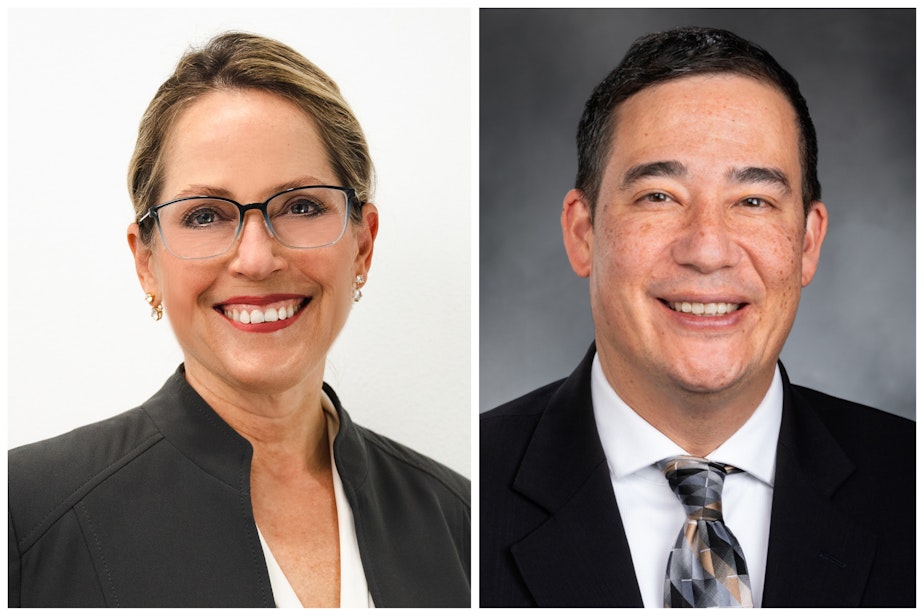Why did the GOP not make the cut in the WA Secretary of State race?

While Washington state Republicans took aim at what they saw as competitive congressional races in our state, they seem to have left an important position, Secretary of State, on the table. The party previously held the office under centrist Kim Wyman. So why did Republicans fail to pull ahead in this race in last week's primaries? KUOW’s Austin Jenkins has been following the race closely. He brought Angela King this analysis.
This interview has been edited for clarity.
Angela King: What do you think happened? How did the Republicans fall short in this race?
Austin Jenkins: Well, it is remarkable because they've held this office for almost six decades. I think there were several factors, but the key here was that the Republicans in the race were not well known to voters, and none of them established themselves as the early front-runner. None of them raised substantial amounts of money, and the state GOP didn't get behind one of these candidates.
One of them, state Senator Keith Wagoner, did earn the endorsements of former Secretaries of State Ralph Munro and Sam Reed, both Republicans, but he didn't have the money to let voters know he had their endorsements and support. So, I think when you have several candidates from the same party in a race, and they're not super well known, there's not a clear front-runner, they tend to split the vote and dilute the vote.
For comparison, the Republican Secretary of State candidate in Arizona, legislator Mark Finchem, is a far-right conservative. He is considered a favorite in that race against his Democratic challenger. We know Arizona politics are very different from ours, but why do you think Washingtonians overall rejected all of the Republican candidates in the Secretary of State's race?
Sponsored
Well, as you say, Arizona is a different beast. It was a key swing state in the 2020 election. It has been a hotbed of election conspiracies. And it was the sight of a pro-Trump, Republican-backed so-called audit of the 2020 election. So, the false narrative that the 2020 election was stolen is alive and well and arguably on steroids in Arizona. That's not the case here.
Now, one of the Republican candidates for Secretary of State here, Tamborine Borrelli, leads a group that has filed legal challenges regarding the 2020 election in Washington. But unlike Finchem, Borelli wasn't already serving in public office and wasn't able to become a breakout candidate. I think another likely factor that's key here in Washington is that we have an open primary system that tends to favor or advantage more moderate or mainstream candidates. Arizona has more of a traditional pick your party primary so there, for the most part, it was Republicans picking Republican candidates and that may have in that case advantaged a more conservative candidate.
Back here at home, Pierce County Auditor Julie Anderson is an independent. She is moving on to the November general election. What do we know about her politics?
She's only ever served in nonpartisan positions, first as a Tacoma City Council member, and then since 2010 as Pierce County's nonpartisan auditor. She certainly sees running without a party affiliation as a particular advantage for the job of Secretary of State. In fact, she wants to make the office nonpartisan. She talks about the current political polarization and says that she “lacks the partisan political baggage that triggers automatic skepticism from one side or the other.”
Steve Hobbs has held the job since former Secretary of State Kim Wyman joined the Biden administration in October. In your opinion, has he done anything that may be relevant as to whether he's going to keep the job, or should keep the job?
Sponsored
It's almost always an advantage to run for election as the incumbent office holder. Hobbs did get 40% of the vote in the primary compared to Anderson's roughly 13%. As you note, he's been in office for less than a year. What he's really touted is the money that was included in the supplemental budget this year to enhance voter security and to try to counter election misinformation. But both he and Anderson are really going to need to spend the next two and a half months before the general election making their case to voters about why they feel they're the best person for the office.
Circling back to the Republicans, some have already called the primary results into question. Legitimate claims or not, how do we improve people's trust in our elections, especially Republican candidates and voters? Have the candidates talked about how they plan to do that?
Yes, rebuilding trust is key. Hobbs touts his experience as a lieutenant colonel with the Washington National Guard. He says he's studied and analyzed cyber attacks and information warfare at the Defense Information School. Meanwhile, Anderson touts her credentials as a certified election administrator. She says she wants to take steps to enhance election security and transparency by doing things like air gap testing to verify that election tabulation equipment is not and cannot be connected to the internet.
I expect that this will be a pretty robust campaign between Hobbs and Anderson in the coming weeks. I will note it is quite unusual to have a non-affiliated candidate in the general election. Usually having the backing of one party or the other is an advantage. But we'll have to see whether it is in this case.
Listen to the interview by clicking the play button above.






